
White collar crime can have serious consequences. It is not uncommon for a person to believe that if he or she does not commit a violent crime then it cannot bear as heavy of a sentence. White collar refers to office businesses and other professional environments. Crimes committed in the professional and financial sectors are serious.
If a person faces accusations of a crime that can be classified as a white collar crime, the stakes are high.
White collar crimes
White collar crimes are not violent. Often perpetrators are those who work in business or finance and may have elaborate schemes to defraud a company. For those who commit white collar crime, their goal is financial gain. Crimes include:
- Money laundering
- Forgery
- Embezzlement
- Tax fraud
- Bribery
According to the FBI, white collar scams are destructive to companies. They can cost investors, wipe out a family’s life savings and bankrupt companies. White collar crime costs the U.S. about 300 billion dollars every year.
A person does not have to take part in a white collar scam to face white collar criminal charges. The Responsible Corporate Officer doctrine presumes that high-ranking corporate officers are aware of his or her corporation’s actions and wrong-doings.
White collar penalties
Whistleblowers often expose white collar criminals. According to the Legal Information Institute, whistleblowing reports have increased. In 2015, there were almost 4,000 tips made to the Securities and Exchange Commission. When charged with a crime, defendants may face misdemeanor or felony charges. The penalties range from fines to prison time. If one person suffers substantial financial harm, it can result in longer prison sentences.
